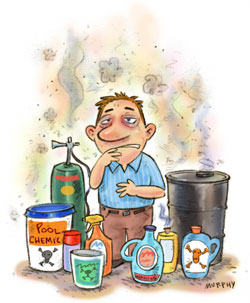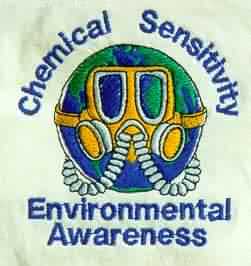Multiple Chemical Sensitivity (sometimes referred to as Environmental Illness) is a condition that affects many people but is still widely misunderstood. It generally refers to any ailment or illness which is the result of environmental factors, such as pollutants or toxins entering the body of the sufferer through a means such as inhalation or ingestion. Multiple Chemical Sensitivity (MCS) is on the increase, the result of us inhabiting a world full of toxins and poisons that are so commonplace that they are now even found in our cleaning and grooming products, amongst many others. People who suffer from MCS are prone to suffering various multiple symptoms upon the exposure to a number of chemicals.
Some chemicals that commonly spark negative reactions in MCS sufferers are (list from Web MD):
- Tobacco smoke
- Perfume
- Traffic exhaust or gasoline fumes
- Nail polish remover
- Newspaper ink
- Hair spray
- Paint or paint thinner
- Insecticides
- Artificial colors, sweeteners, and preservatives in food
- Adhesive tape
- New carpet
- Flame retardants on clothing and furniture (such as mattresses)
- Felt tip pens
- Chlorine in swimming pools
Many of the chemicals that spark reactions in MCS sufferers are Petro-Chemicals. This means that they are derived from petroleum based products, most of which have never been tested on humans to see if there is any negative long term impact. As mentioned on Our Little Place, these chemicals have been used in products under the motto “safe until proven toxic”. What kind of a policy is that? You would be forgiven for thinking that that motto ought to be the other way around, and you’d be right…it should be.
One of the biggest offenders is perfume and other scented products. Did you know that many of the ingredients in your perfume are the exact same ingredients found in Gasoline?! I didn’t either! The scary thing is that the perfume industry is not regulated at all – they can put any number of chemicals in fragrance without revealing what those chemicals are – or how they affect humans. We humans are all participating in a giant “lab experiment” against our knowledge and against our will, and it’s making some of us very sick. – Our Little Place
I’m sure we have all, at least once, been in the position of having a headache with no apparent reason for it. Well, the chances are that there actually was a good reason for it, you just didn’t know what it was. There is a possibility that there was someone nearby who had recently sprayed an aerosol, perfume or pesticide near you. Your headache is merely your bodies way of telling you “there is something wrong with the air you are breathing!”
The thing with MCS is that it is all a bit of a gamble. Symptoms can arise as result of a major event, such as a large scale chemical spill, or from long-term contact with low-levels of chemicals, such as in an office or home with poor ventilation. We are never able to say at what point of exposure a person will exhibit symptoms of MCS. Most of us will carry on in our lives, using the same products we used to use and breathing the same quality of air that we are used to breathing feeling relatively safe that we are in no harm, but sadly this is not the truth.
We are in danger. Every exposure to a toxin potentially takes you closer to suffering from MCS. Although it has not been proven to work like this, there is currently no evidence to suggest such a claim is incorrect. So, what exactly are the symptoms of MCS?
The symptoms of MCS may include:
- Headache
- Fatigue
- Dizziness
- Nausea
- Irritability
- Confusion
- Difficulty concentrating
- Intolerance to heat or cold
- Earache
- Stuffy head or congestion
- Itching
- Sneezing
- Sore throat
- Memory problems
- Breathing problems
- Changes in heart rhythm
- Chest pain
- Muscle pain and/or stiffness
- Bloating or gas
- Diarrhea
- Skin rash or hives
- Mood changes
Not a very nice set of conditions, I’m sure you’ll agree. Now, suffering from those nasties is one thing, but imagine not knowing when they were going to come on. All it could take is one person to walk past you after just having applied a liberal dose of aftershave and that could be it, any of the symptoms could start to make themselves known, sometimes instantly.
To summersise I am going to again quote Our Little Place, as they have made this point very well:
The products we use on our skin are absorbed directly into the bloodstream (the reason why nitroglycerine, nicotine, and hormone patches work). The chemicals we breathe (such as perfumes, formaldehyde, pesticides, etc.) all go straight to our brains and can cause low-level to severe damage – similar to how someone can snort cocaine or glue to get a “high”. Start reading labels – check for petro-chemicals, formaldehyde, and fragrance, and avoid them as much as possible. A clue that an ingredient may be a petro-chemical is the “prop” prefix. A clue that an ingredient releases formaldehyde is “Quaternium”. Be careful about products labeled “fragrance free” or “unscented”. Don’t trust them! Read the label and be sure they don’t list “fragrance” or “masking fragrance”. Don’t put anything on your skin you’d be afraid to eat, because the end result is the same!




The usual response I’ve found when explaining this is typically that there are a lot more harmful things out there.
When you point out how trying to cut them out is a good thing, you get the response of I “don’t do x, y and z so why not use perfumes” etc.
People are no longer willing to go around smelling like themselves they have to smell like flowers or what ever bullshit these companies make up now, which in fact do not smell like anything you can relate to.